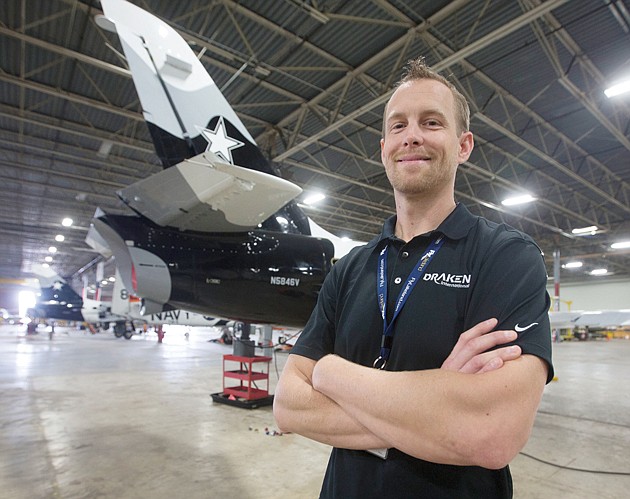- March 31, 2025
-
-
Loading

Loading

It is too expensive for America's military flyers to practice against themselves, but without regular training against competent adversaries, they could lose their edge when it matters most.
That's why, in 2014, the Pentagon came up with a solution: Outsource “Adversary Air.” That gave birth to the commercial Red Air industry, where there are hire-a-foe, war-game bad guys sophisticated and scary enough to spar with the good guys.
Draken International, based at Lakeland Linder Airport in Polk County, has emerged as the U.S. Air Force's primary sparring partner in this new world. “It's definitely a booming business,” says Sean “Stroker” Gustafson, Draken's vice president for client relations. “And a dream job.”
How booming? Draken posted three-year revenue growth of more than 4,068%, going from less than $1 million in 2014 to more than $18.8 million in 2016, according to the 2017 Inc. 500. It was sixth fastest growing private business in Florida, and No. 90 in the country in the Inc. 500 rankings. Gustafson, who declines to disclose any other specific sales figures, says in an email that revenue doubled last year.
A former F-16 pilot and retired Air Force lieutenant colonel, Gustafson was among the Black Diamond Heavy Metal Jet Team aerial show performers recruited in 2011 by Jared Isaacman, founder of Pennsylvania-based payments-processing firm Harbortouch, to form Draken.
Isaacman anticipated an emerging need for commercial adversary support as the dynamics of technology, manpower demands and budget cuts forced the Air Force to consider outsourcing war-game opponents.
It costs more than $50,000 an hour to fly an F-22 Raptor, the Air Force's stealth tactical fighter soon to be replaced by the F-35 Lightning, which will cost even more to operate. In addition, the Pentagon has placed a premium on Air Force and Navy F-15s, F-16s and F-18s use, limiting the hours these “legacy” fighters fly, to extend service times. Training budgets, meanwhile, continue to be trimmed and a manpower shortage, especially pilots, has made it increasingly difficult to field enough bad guys who are good enough to provide a challenge.
All Isaacman needed was war jets, the pilots, crews and maintenance technicians to fly them. And a place to put them all.
Draken went big from the start, executing its “Field of Dreams - if you build it they will come” strategy by purchasing the best fighter jets available and building extensive infrastructure. That includes a $6.7 million investment from Isaacman, at Lakeland Linder, to house and maintain the jets.
Draken secured its first contract in 2010 with the U.S. Navy, flying 800 “adversary” hours. In November 2015 it got a contract to fly against the Air Force at Nellis Air Force Base near Las Vegas. The company is now the Air Force's biggest adversary contractor. This year, it will fly more than 42,000 hours in 12 locations against the Air Force.
Draken's fleet has nearly tripled in five years. With more than 140 tactical aircraft — including 77 Russian-built MiG-21s; 28 Czech-built L-159Es; and nine Italian-built MB-339CBs — Draken owns the world's largest private fleet of combat fighter jets. Veteran, combat-tested Air Force, Navy and Marine Corps pilots and experienced air crews with thousands of hours of flight time man the flying machines.
Other than its fleet and pilots, Gustafson says Draken's investment in upgrading aircraft with late-generation electronics also sets it apart from competitors. Draken's A-4K Skyhawks, purchased from New Zealand, are equipped with radar, avionics and capabilities typically found in the F-16, for example.
“We can put five of our A-4K Skyhawks in the air for the price of a single F-16 on an hourly basis,” says Gustafson. “Capacity and capability are the cornerstone of our organization.”
Of Draken's 120 employees, 40 work in Lakeland and, generally, about 80 operate in Nevada, Gustafson says. More employees could be forthcoming as the company keeps up with the growth.
Also coming soon: the arrival of 22 Mirage F1Ms purchased in September from the Spanish air force. Those planes will be among aircraft Draken deploys in its first war-game exercise outside the U.S., after it recently signed a CAS contract with the French navy. Says Gustafson: “It is truly a global industry.”